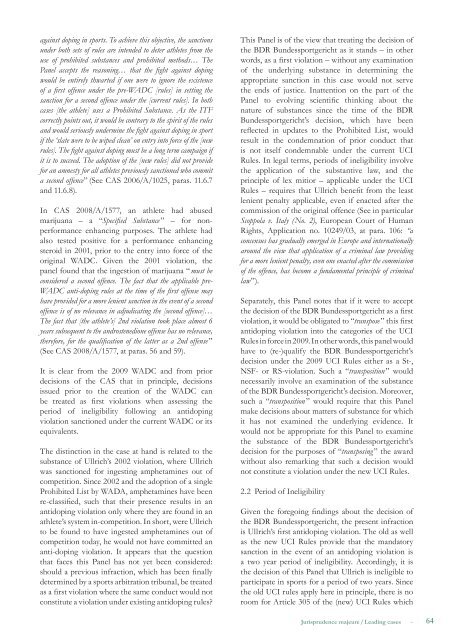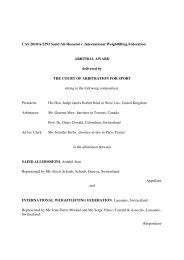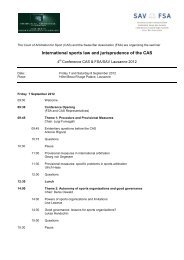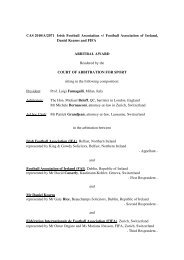(CAS) Bulletin - Tribunal Arbitral du Sport / TAS
(CAS) Bulletin - Tribunal Arbitral du Sport / TAS
(CAS) Bulletin - Tribunal Arbitral du Sport / TAS
You also want an ePaper? Increase the reach of your titles
YUMPU automatically turns print PDFs into web optimized ePapers that Google loves.
against doping in sports. To achieve this objective, the sanctions<br />
under both sets of rules are intended to deter athletes from the<br />
use of prohibited substances and prohibited methods… The<br />
Panel accepts the reasoning… that the fi ght against doping<br />
would be entirely thwarted if one were to ignore the existence<br />
of a fi rst offence under the pre-WADC [rules] in setting the<br />
sanction for a second offence under the [current rules]. In both<br />
cases [the athlete] uses a Prohibited Substance. As the ITF<br />
correctly points out, it would be contrary to the spirit of the rules<br />
and would seriously undermine the fi ght against doping in sport<br />
if the ‘slate were to be wiped clean’ on entry into force of the [new<br />
rules]. The fi ght against doping must be a long term campaign if<br />
it is to succeed. The adoption of the [new rules] did not provide<br />
for an amnesty for all athletes previously sanctioned who commit<br />
a second offence” (See <strong>CAS</strong> 2006/A/1025, paras. 11.6.7<br />
and 11.6.8).<br />
In <strong>CAS</strong> 2008/A/1577, an athlete had abused<br />
marijuana – a “Specifi ed Substance ” – for nonperformance<br />
enhancing purposes. The athlete had<br />
also tested positive for a performance enhancing<br />
steroid in 2001, prior to the entry into force of the<br />
original WADC. Given the 2001 violation, the<br />
panel found that the ingestion of marijuana “ must be<br />
considered a second offence. The fact that the applicable pre-<br />
WADC anti-doping rules at the time of the fi rst offense may<br />
have provided for a more lenient sanction in the event of a second<br />
offence is of no relevance in adjudicating the [second offence]…<br />
The fact that [the athlete’s] 2nd violation took place almost 6<br />
years subsequent to the androstenedione offense has no relevance,<br />
therefore, for the qualifi cation of the latter as a 2nd offense ”<br />
(See <strong>CAS</strong> 2008/A/1577, at paras. 56 and 59).<br />
It is clear from the 2009 WADC and from prior<br />
decisions of the <strong>CAS</strong> that in principle, decisions<br />
issued prior to the creation of the WADC can<br />
be treated as fi rst violations when assessing the<br />
period of ineligibility following an antidoping<br />
violation sanctioned under the current WADC or its<br />
equivalents.<br />
The distinction in the case at hand is related to the<br />
substance of Ullrich’s 2002 violation, where Ullrich<br />
was sanctioned for ingesting amphetamines out of<br />
competition. Since 2002 and the adoption of a single<br />
Prohibited List by WADA, amphetamines have been<br />
re-classifi ed, such that their presence results in an<br />
antidoping violation only where they are found in an<br />
athlete’s system in-competition. In short, were Ullrich<br />
to be found to have ingested amphetamines out of<br />
competition today, he would not have committed an<br />
anti-doping violation. It appears that the question<br />
that faces this Panel has not yet been considered:<br />
should a previous infraction, which has been fi nally<br />
determined by a sports arbitration tribunal, be treated<br />
as a fi rst violation where the same con<strong>du</strong>ct would not<br />
constitute a violation under existing antidoping rules?<br />
This Panel is of the view that treating the decision of<br />
the BDR Bundessportgericht as it stands – in other<br />
words, as a fi rst violation – without any examination<br />
of the underlying substance in determining the<br />
appropriate sanction in this case would not serve<br />
the ends of justice. Inattention on the part of the<br />
Panel to evolving scientifi c thinking about the<br />
nature of substances since the time of the BDR<br />
Bundessportgericht’s decision, which have been<br />
refl ected in updates to the Prohibited List, would<br />
result in the condemnation of prior con<strong>du</strong>ct that<br />
is not itself condemnable under the current UCI<br />
Rules. In legal terms, periods of ineligibility involve<br />
the application of the substantive law, and the<br />
principle of lex mitior – applicable under the UCI<br />
Rules – requires that Ullrich benefi t from the least<br />
lenient penalty applicable, even if enacted after the<br />
commission of the original offence (See in particular<br />
Scoppola v. Italy (No. 2), European Court of Human<br />
Rights, Application no. 10249/03, at para. 106: “a<br />
concensus has gra<strong>du</strong>ally emerged in Europe and internationally<br />
around the view that application of a criminal law providing<br />
for a more lenient penalty, even one enacted after the commission<br />
of the offence, has become a fundamental principle of criminal<br />
law”).<br />
Separately, this Panel notes that if it were to accept<br />
the decision of the BDR Bundessportgericht as a fi rst<br />
violation, it would be obligated to “transpose ” this fi rst<br />
antidoping violation into the categories of the UCI<br />
Rules in force in 2009. In other words, this panel would<br />
have to (re-)qualify the BDR Bundessportgericht’s<br />
decision under the 2009 UCI Rules either as a St-,<br />
NSF- or RS-violation. Such a “transposition ” would<br />
necessarily involve an examination of the substance<br />
of the BDR Bundessportgericht’s decision. Moreover,<br />
such a “transposition ” would require that this Panel<br />
make decisions about matters of substance for which<br />
it has not examined the underlying evidence. It<br />
would not be appropriate for this Panel to examine<br />
the substance of the BDR Bundessportgericht’s<br />
decision for the purposes of “transposing ” the award<br />
without also remarking that such a decision would<br />
not constitute a violation under the new UCI Rules.<br />
2.2 Period of Ineligibility<br />
Given the foregoing fi ndings about the decision of<br />
the BDR Bundessportgericht, the present infraction<br />
is Ullrich’s fi rst antidoping violation. The old as well<br />
as the new UCI Rules provide that the mandatory<br />
sanction in the event of an antidoping violation is<br />
a two year period of ineligibility. Accordingly, it is<br />
the decision of this Panel that Ullrich is ineligible to<br />
participate in sports for a period of two years. Since<br />
the old UCI rules apply here in principle, there is no<br />
room for Article 305 of the (new) UCI Rules which<br />
Jurisprudence majeure / Leading cases<br />
-<br />
64





